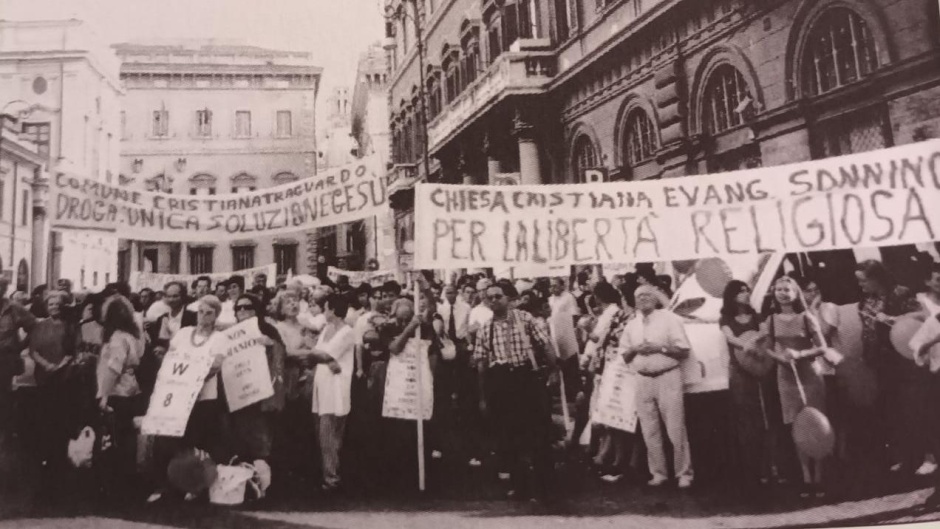AEI: from the uncertainties of the 90s to the present-day stabilisation (II)
In the last decade, the Italian Evangelical Alliance has represented the demands of the evangelical world internally (prayer), externally (religious freedom), and in the international arena (relations with Catholicism).
25 APRIL 2024 · 10:26 CET

This is the second part of an article on the history of the Italian Evangelical Alliance. Read the first part.
After 1988, the Italian Evangelical Alliance went through a period of institutional uncertainty. In fact, four different presidents alternated within a few years.
Even the magazine Idea had ceased regular publication. In this decade of change, however, there was no shortage of important initiatives.
Since 1996, the Day of Prayer for the Persecuted Church (the IDOP of the World Evangelical Alliance), the International Week of Prayer (of the European Evangelical Alliance), and Remembrance Sunday (the last Sunday in October) have been celebrated with regularity.
AEI's calendar initiatives invite evangelical churches to come together in special gatherings to emphasise closeness to the persecuted church, to pray together (in the wake of the beginnings of the Evangelical Alliance in 1846, which was born precisely as a prayer movement), and to cultivate the memory of the history of the evangelical people (on the anniversary of the Protestant Reformation on October 31, the day Martin Luther's 95 theses were posted in Wittenberg). Celebrated regularly to this day, they provide the life of AEI, regular calendar events, and an opportunity for member churches to cultivate unity of purpose in celebrating significant dates for evangelicals worldwide.
Also in 1996, with the publication of a booklet containing the texts of the Lausanne Covenant (1974) and the Manila Manifesto (1989), the Covenant and the Lausanne Movement began to intertwine in the service of evangelical unity and mission.

A number of AEI's magazine IdeaItalia, in 2007. As a crowning moment in the life of the Alliance, the regular publication of the AEI newsletter, Ideaitalia, resumed in 1997 and became a milestone in the life of the Association.
In 1999, AEI took the initiative to organise public events focusing on religious liberty. That year, a rally gathered a thousand people and gave voice to the need for Italy to take a step forward regarding the deficit of attention to religious minorities.
Another constant in the life of AEI is its focus on Roman Catholicism, so that the evangelical witness maintains its consistent critique of the Roman Catholic system without ecumenical compromise.
At the same time, relationships with other religious expressions remain important are always at the forefront. The Commission on Theology and Dialogue is working on a document entitled "Alliance and Co-Belligerence: When is it Biblically Right to Collaborate?” (2011) to emphasize the principle that while the evangelical faith cannot compromise in doing "mission" and "evangelisation" with those who have a different understanding of the gospel (e.g. Roman Catholicism), it is called to cooperate with all for the common good in actions to defend religious freedom, life, family, etc.
Regarding Islam, an important document was prepared, "Gospel and Islam: Affirmations and Denials on Christian Witness" (2011, and endorsed by dozens of evangelical works and missions) to reaffirm how Christianity is different from Islam, without leading to Islamophobic attitudes.

In 2013, the presidency passed to Giacomo Ciccone, the current president, and AEI, after years of stabilisation and consolidation, experienced a period of revitalisation in its ability to represent the demands of the evangelical world internally (as a prayer movement), externally (on the religious freedom front), and in the international arena (especially in relations with Catholicism).
In 2017, the AEI promoted an "open letter" to the World Evangelical Alliance on the risks of ecumenical compromise with Roman Catholicism. This initiative is also signed by other Evangelical Alliances, including the Spanish Alliance, which since the 1980s has established a convergence with the Italian Alliance on these issues.
The occasion of the 50th anniversary allows the Italian Evangelical Alliance to reflect on its relatively short but significant life. For the Italian evangelical world, 50 years is considered a "long" era.
For a minority that went through the travails of the unification of Italy, then Fascist repression, with all the pressures of curtailed religious freedom and problems of survival, to have come a full 50 years is remarkable.
The AEI is unique in the Italian scene and should be appreciated and celebrated also for having been able to link Italian evangelicalism with European and world evangelicalism.
In its future, the AEI will be challenged to involve and engage more and more Italian evangelical areas and individual men and women who, called by the Lord, are able to cultivate the evangelical identity and values of the AEI in an ever-wider way.
Chiara Lamberti, member of the Italian Evangelical Alliance, in Rome.
One more year
Learn all about our #OneMoreYearEF campaign here (English).
Published in: Evangelical Focus - European perspectives - AEI: from the uncertainties of the 90s to the present-day stabilisation (II)
